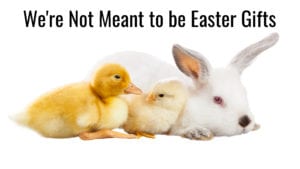 Ah, springtime. Warmer weather, blooms bursting forth from the ground and trees – it’s earth’s ways of celebrating new life. Springtime also brings traditional Easter celebrations. But there’s one tradition associated with Easter that should be carefully reconsidered.
Ah, springtime. Warmer weather, blooms bursting forth from the ground and trees – it’s earth’s ways of celebrating new life. Springtime also brings traditional Easter celebrations. But there’s one tradition associated with Easter that should be carefully reconsidered.
A few weeks from now, animal shelters and rescues will be crowded with spring litters from unaltered cats and dogs. Too often, baby chicks, ducklings, or bunnies that were going to be the cutest Easter gift EVER will be joining them. In fact, around 80 percent of rabbits found in shelters were Easter gifts. The majority will end up being euthanized, so before you decide to give a baby bunny or chick as an Easter gift, here are some key facts about these types of pets that you should know.
While rabbits can be wonderful pets, they require mature, responsible owners. They are NOT good with children, and they require almost as much work as a dog. They must be house-trained. Rabbits also love to chew things, so the house must be bunny-proofed or they will chew through electrical cords, furniture, baseboards, books, rugs and other items. They must also be spayed or neutered lest they mark the house with urine and feces or give birth to another litter of little ones. Chicks and ducklings also grow quickly and require a lot of care.
If you are certain you want and can care for a new pet bunny, chicken or duck, that’s wonderful – but please, please, wait until after Easter – remember, there is never a shortage of adoptable pets. In the meantime, go for the stuffed variety. (And don’t forget to keep chocolate ones away from your pets – chocolate is toxic for them.) Hoppy Easter!

